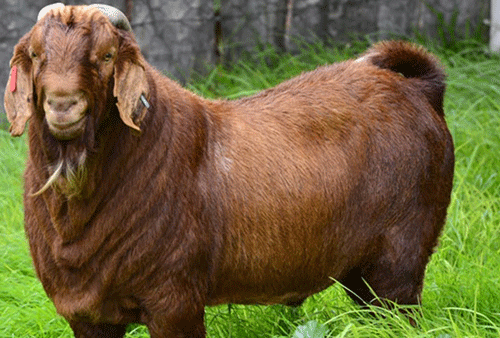The indigenous Kalahari Red goats arrived in South Africa and Namibia with migrating tribes from the north of Africa. Early records describe lob-eared goats in the Western Cape, Eastern Cape and Northern Cape, as well as in areas of Namibia.
Farmers in the Northern Cape who preferred red lob-eared goats began selecting a specific type that was slightly smaller than the red-and-white improved Boer goat.
In the 1970s, Tollie Jordaan of Grootvlakte in the Somerset East district, Albie Horn of Hartebeeshoek near De Aar in the Northern Cape, Louis van Rensburg of Wonderpan near Prieska, also in the Northern Cape, as well as Ben Vorster of Tshipese in Limpopo, all started breeding and selecting red goats.
In 1998, the goats were shown with Savannahs in Bloemfontein as ‘Brown Savannah’.
Later, DNA tests were conducted to determine
if there was sufficient genetic separation between the Boer goats, Savannahs and Kalahari Reds to warrant registering a new breed.
The results showed that the difference between the red goats and the Boer goats was greater than between the Boer goats and the Savannahs.
On 5 July 1999, the Kalahari Red Club was founded in Kimberley – and in October 2004, the club merged with the South African Boer Goat Breeders’ Society.
Description
The Kalahari Red is a red, medium-to large-framed lob-eared meat goat.
It has a fine head, round horns bent backwards and a loose, supple skin with folds (prominent in rams).
The ewe must be feminine, wedging slightly to the front.
The ram is heavier in the head, neck and forequarters.
The ideal is a brown goat with colour shadings that range from light brown to dark brown. It has a well-pigmented, smooth, short hair coat.
Production norms
Age at first breeding: six months;
100-day weaning weight of ram kids: 25kg
100-day weaning weight of ewe kids: 21kg
Mature weight ewes: 75kg
The meat is tender, tasty and low fat at a young age. The quality of the skin is excellent, which is a value-added trait.
– Farmersweekly.com.za


